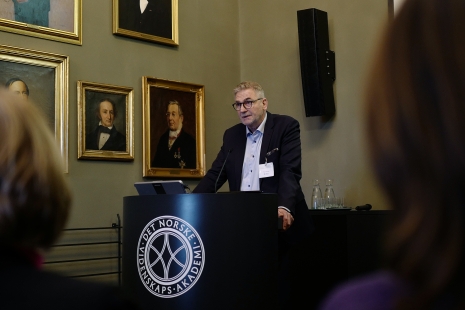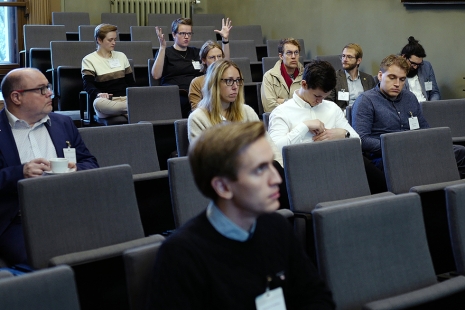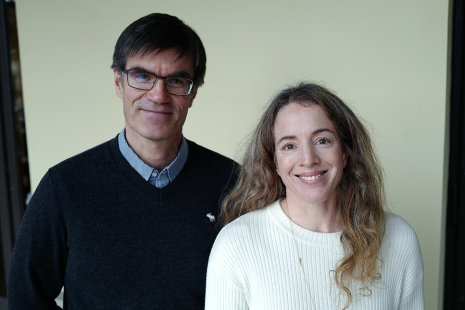
The North Sea as an Energy Hub
The VISTA program is a continuation of a more than 30-year long collaboration between Statoil (now Equinor) and The Norwegian Academy of Science and Letters.
On this background, the aim of the program is to support science that provides fundamental insight in: Basin analysis and efficient resource identification and utilization, or future development solutions, or sustainability, environment and low carbon solutions.
Two new centers have been established as VISTA-centers to host scientists from both academia and relevant business partners.
VISTA CSD Center for Modeling of Coupled Subsurface Dynamics in Bergen (UiB)
NTNU VISTA CAROS - Centre for Autonomous Robotics Operations Subsea is located in Trondheim (NTNU)
Magnus Takvam moderated the seminar. He has worked as a journalist and commentator at NRK for forty years. He has followed climate, environment and energy policy closely and now works as an independent commentator and author.
Asgeir Tomasgard, FME, NTRANS / NTNU Energy Transition
Miranda Schreurs, Chair of Environmental and Climate Policy, Technical University of Munich
Franziska Holz, Deputy Head, Energy, Transportation, Environment Department, DIW Berlin
Linda Steg, University of Groningen
Simen Moxnes, Senior advisor, Equinor
Nils Gunnar Kvamstø, Institute of Marine Research
Ane Torvanger Brunvoll, Head of Energy System Section, the Norwegian Water Resources and Energy Directorate
John Olav Tande, Chief Scientist, SINTEF
Sarah Eileen Gasda, Research director, NORCE
Ståle Aakenes, Senior researcher, Gassnova
"Russia is Europe’s new pariah. We will have to think about how to reengage with Russia." This was one of the comments when ten handpicked scientists gave their perspectives on the energy situation in Europe during this years VISTA seminar.
Ten excellent scientists presented their views during the seminar. The North Sea’s future role, renewables, off-shore wind energy as well as green and blue hydrogen and carbon capture was on the agenda under the headline "The North Sea Energy Hub and Our Sustainable Future". The seminar was opened by Lise Øvreås, President of The Norwegian Academy of Science and Letters together with Tor Ulleberg from Equinor.
The first part of the seminar was dedicated to the European perspective on the ongoing energy crisis, especially the transition to renewable energy and the conversion from fossil fuels to renewable energy.
Professor Miranda Schreurs (Technical University of Munich) is a political scientist and an advisor on energy for the governments in both Japan and Germany. "The push to change from fossil to renewables is strong in Europe. There is a lot of green initiatives going on, like the EU Climate Law, the “Fit for 55”- policies, which is on how to reduce the greenhouse gases", said Miranda Schreurs.
The speed for the laws passing is fast and it concerns a wide variety of sectors, like transport, heat capture, circular energy, and green hydrogen.
Climate crisis and Ukraine war
To live in a world with temperature rising only 1,5 degrees, the mankind needs to do more - by seven times. If the Ukraine war is overwhelming, the climate crisis is a bigger issue still.
- When the Ukraine war is over, we will need to rebuild Ukraine. Europe has been dependent on Russia for gas, oil, coal and nuclear energy. In Ukraine, the infrastructure needs to be rebuilt, and the dependence on the North Sea potential will be more important, said Schreurs.
One of the questions after the talk was what happens when or if Russia loose the European gas market?
- Russia is Europe’s new pariah. The willingness to work with Russia in Europe is quite limited. China is building the Siberian gasline, but I think the European market is bigger than the Asian market. It all depends on what Russian regime we will see in the future. We have to think about how to reengage with Russia, said Schreurs.
Private households versus industry
Professor Franziska Holz followed up on with a talk on European gas markets today and dependencies on Russia.
- If people are saving energy and using 20 percent less, it will help potential energy shortages, said Holz.
Also, energy imports to Europe is important, especially after the sabotage of the Nord Stream gas pipelines in September 2022. Thanks to large import capacities, European importers can cope with Russian shortfalls in 2022 and in the next years by increasing imports from elsewhere while only modestly reducing their consumption.
Norway, with its North Sea gas resources is an important factor in this.
Still, in Germany the political discussion is about balancing the demand for energy in private households and in the industry. Holz presented several models for different scenarios. - We need to rethink Europe as a community when it comes to energy. We have a shared interdependency, and the North Sea can be a source for energy in the future, Holz said.
The presentations were followed by a panel discussion centering around issues on how to harvest the energy resources from the earth's surface without being detrimental to biological diversity.
VISTA Researcher day
The previous day young researchers gathered at the Academy for workshops focusing on the topic of the VISTA seminar. The Young Researchers in the VISTA program are based at the two VISTA centers in Bergen and Trondheim.
- We are leaving the young researchers with the climate crisis, the energy crisis and the Ukranie war. The challenge is that you can do better than we did, Miranda Schreurs said to the young researchers in the room.


